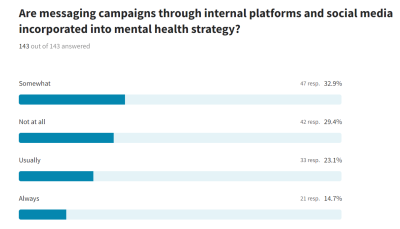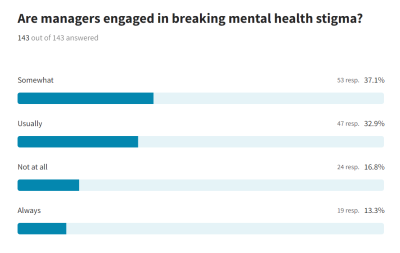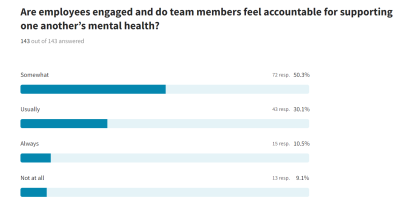Employers give themselves poor marks in terms of providing mental health services to their employees but high scores for supporting initiatives to improve diversity, equity and inclusion among their rank and file, according to a new survey by the Northeast Business Group on Health (NEBGH).

The survey found that about 1 in 4 respondents (26%) never identify what their employees’ mental health needs might be nor do they test whether workers are aware of mental health programs and how effective those programs might be. About 3 in 10 employers (29%) do not use social media and internal online tools to enhance their mental health strategies.
A little less than half of respondents (47%) said that managers are always or usually engaged in breaking the mental health stigma, and 49% say that their managers for the most part know how to respond to an employee’s mental health needs and steer them toward necessary resources.
A little over half (52%) will supply mental health information in a wide variety of ways, and Amy Tippett-Stangler, NEBGH’s senior vice president, tells Fierce Healthcare that she “took that as a positive. Employers would like that to be higher. But I think that they’re doing a terrific job.”

Tippett-Stangler said that while employers have become very much aware of mental health needs over the last few years, they’d still like guidance on the best ways to address those needs. NEBGH assembled a task force of about 15 mental health professionals from health plans, employers, hospital systems, and community organizations to help develop the questions used in the survey.
In general, NEBGH members wanted to know: “Are we as employers doing everything we can to create this culture of wellness?” said Tippett-Stangler.
The target audience comprised the benefits professionals at companies that could share the survey link with everybody within the organization. The questions target the C-suite, managers and employees.
“It’s not so much wondering if they’re doing enough, but are they doing the right things?” said Tippett-Stangler. “Are they offering the right solutions? And how do they better communicate?”
One problem is that employees are not always aware of what their benefits packages contain until they need something. “And many times, that’s at a point of crisis,” said Tippett-Stangler.
Employers want to review whether they can better support mental health by perhaps waiving copayments or finding ways to increase the utilization of employee assistance programs.
While employers might feel that they’re still finding their way when it comes to mental health, in other areas they think they’re on the right track.

For instance, about two-thirds (63%) said they always or usually support DEI initiatives, while 3 in 4 respondents (76%) said that they always or usually support a healthy work-life balance. More than 8 in 10 respondents (85%) said they’re OK with a flexible work environment where possible and 8 in 10 (81%) encourage employee community involvement.
“Even though there’s more work to be done, the good news is that mental health and overall well-being is high on the priority list of employers that have responded to date,” Tippett-Stangler said. “We look forward to assessing more results as employers around the country take the survey.”